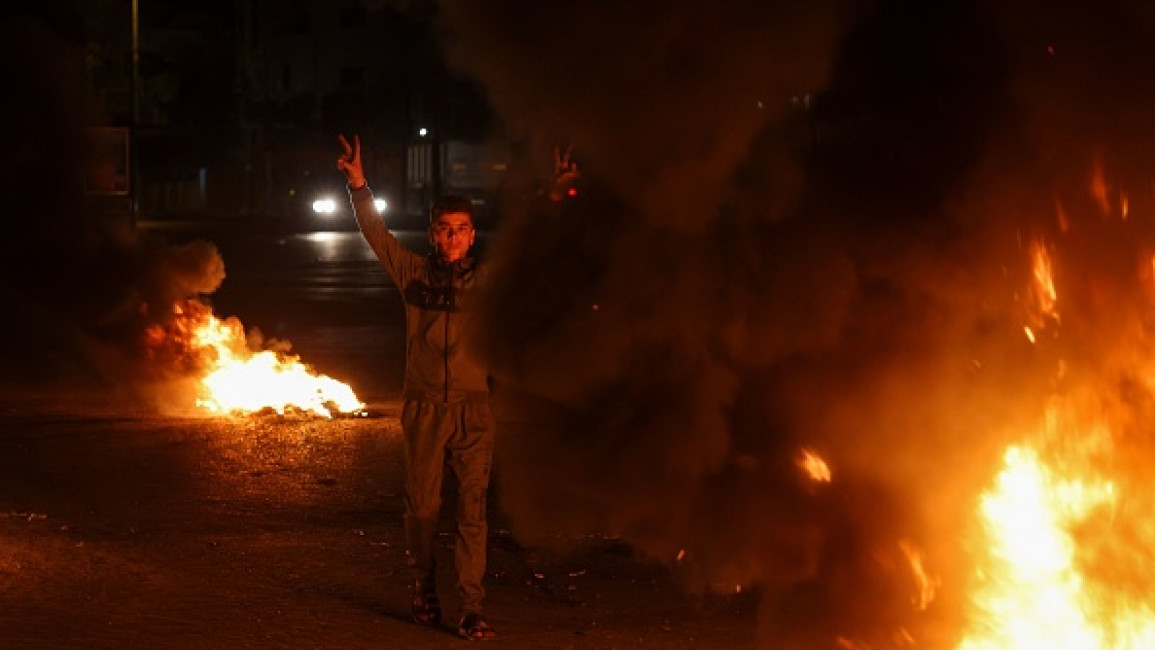Anger and anxiety beset Palestinians in Gaza as confrontations in Al-Aqsa escalate
Palestinians in the besieged coastal enclave of the Gaza Strip are anxiously following up on the developments at the Al-Aqsa compound on Wednesday.
Earlier in the week, extremist settler groups called on the settlers to slaughter offerings in the courtyards of Al-Aqsa mosque in celebration of the Jewish Passover holiday, which coincides halfway through Ramadan, the holiest Islamic month.
Israeli police then brutally attacked and arrested hundreds of worshipers inside the Al-Aqsa mosque in Jerusalem early Wednesday, a move denounced as an "unprecedented crime" by the Palestinian movements, human rights organizations, and neighbouring countries like Egypt.
Israeli police claimed they had entered the mosque to dislodge "agitators" who had barricaded themselves inside with fireworks, sticks, and stones.
In their response to the Israeli police's attack on Al-Aqsa, Palestinian armed groups in Gaza launched eleven rockets at the Israeli cities adjacent to the besieged territory, causing damages in an Israeli factory in Sderot city, according to the Israeli army.
A few hours later, the Israeli warplanes struck two facilities belonging to the Islamic Hamas movement and the Israeli military shelled "field monitoring" points belonging to the Al-Qassam Brigades in the town of Beit Lahia in the northern Gaza Strip and east of Khan Yunis in the south, without causing any casualties.
"Our fighter jets raided a Hamas weapons production and weapons production and storage site in response to the 9 rockets fired tonight from the Gaza Strip," Avichai Adrea, the spokesperson of the Israeli army, claimed in a press statement.
"The raids constitute a blow to the armament and strength-building capabilities of Hamas," he added. Adrea stressed that Israel holds Hamas full responsibility for what is happening in the Gaza Strip and will pay the price for the security violations against Israel.
Members of the armed Palestinian factions fired anti-aircraft guns at the raiding planes, according to Palestinian security sources.
Hazem Qassem, a spokesperson of Hamas, said in a press statement sent to TNA that "the Israeli attacks of Gaza came in a bid to prevent Gaza from continuing its support by all means for our people in Jerusalem and the West Bank."
Meanwhile, dozens of young men headed to the eastern fence of Gaza City to demonstrate their rejection of the "Israeli crimes against the Palestinian worshipers inside the Al-Aqsa mosque."
Raising Palestinian flags, the protestors set fire to tires and stung grenades at the Israeli army while chanting against Israeli violations in the occupied Jerusalem and Al-Aqsa mosque.
The mosque compound in the Israeli-annexed Old City of east Jerusalem has previously seen increasing violence by Israelis, particularly during the Muslim fasting month of Ramadan, which draws tens of thousands of worshippers to Al-Aqsa.
"The current irrational Israeli attacks are similar to what happened in 2021 when settlers wanted to slaughter sheep in the courtyards of our holy mosque," Abdul Qadir Abu Salah, based in Gaza, said to TNA.
The 45-year-old father of three expressed fears of further deterioration in the Gaza Strip if the settlers carried out the sacrificial slaughter as promised.
"The resistance will not remain silent in the face of these provocative measures committed by the Israeli occupation in Al-Aqsa Mosque. Slaughter of sacrifices means the outbreak of a sixth war between Israel and the Gaza Strip as did in 2021," he added.
The same fears were shared by Mohammed Omar, another resident of Gaza, who believed that Israel would not stop its crimes against Al-Aqsa and push the region toward escalation.
Speaking to TNA, the 28-year-old father of two said, "What makes the matter worse is that we are left alone to defend Al-Aqsa and Jerusalem, even though they are Islamic holy places and belong to all Muslims, not just Palestinians."
"It is the right time for the Arabs to rise against their governments and force their leaders to put pressure on Israel to stop its crimes or to cancel the peace agreements with it if it refuses," he added.
On 10 May 2021, Israel launched a large-scale military campaign against the Gaza Strip in retaliation for firing rockets into Israel by the armed factions led by Hamas in response to Israeli provocations at the Al-Aqsa Mosque in East Jerusalem.
Back then, Hamas fired a barrage of rockets toward Jerusalem in support of Palestinian protests against Israel's brutal crackdown at the Al-Aqsa Mosque compound and the threatened eviction of dozens of Palestinian families by Jewish settlers in a nearby neighbourhood.
An eleven-day war erupted after weeks of Israeli assaults on protesters in Jerusalem, including at the Al-Aqsa Mosque.
Hamas fired over 4,000 rockets and mortars toward Israel. Israel has said it struck over 1,000 targets linked to Gaza militants.
Around 254 people were killed in Gaza, including at least 67 children and 39 women, according to the Gaza Health Ministry. Hamas has acknowledged the deaths of 80 militants, while Israel has claimed the number is much higher.
About twelve Israelis were killed by the Palestinian attacks, Israeli outlets claimed.


![President Pezeshkian has denounced Israel's attacks on Lebanon [Getty]](/sites/default/files/styles/image_684x385/public/2173482924.jpeg?h=a5f2f23a&itok=q3evVtko)



 Follow the Middle East's top stories in English at The New Arab on Google News
Follow the Middle East's top stories in English at The New Arab on Google News


